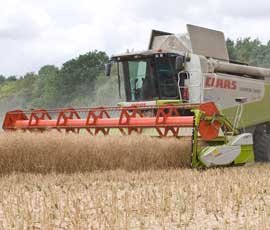Oilseed rape on top

Oilseed rape is going to be the crop of the year this harvest, with excellent yields already recorded, according to Masstock agronomist David Neale.
“I had a big block of Expower cut near Newbury, Berkshire, which all did over 5t/ha (2t/acre), moisture adjusted to 8%, with one field doing 5.7t/ha (2.3t/acre).
“Another block near Cirencester, Wiltshire, did 4.8-4.9t/ha (1.9-2t/acre). I think the rape crop generally is going to be the best performer this year.
“Even in the droughty areas the rape has performed better than I would have thought, at 3.3-3.5t/ha (1.3-1.4t/acre) in the eastern counties. If that’s the worst, then it’s pretty good.
“Without question, a lot of the hybrids are going to give the best results. I’m very optimistic, provided we get some fine weather.”
Although a lot of crops had been desiccated and were ready to cut, many farmers had used pod sealant to prevent yield loss, said Mr Neale.
“However, in the past four or five weeks we’ve seen a lot of verticilium wilt. People have got to be really careful with their rotation – it’s not variety specific, it’s about too tight a rotation.
“It comes in at, or even after desiccation, so often it is not picked up.”
Winter barley yields in eastern counties were dire, at 3.7-5.6t/ha (1.5-2.25t/acre), but further west and north yields were pretty good, he added.
“At home in the Cotswolds we did 28ha (70 acres) of Cassia at 7.9t/ha (3.2t/acre), with a nice bold bushelweight.”
Hybrids had done particularly well, at 9.4-10t/ha (3.8-4t/acre). “All hybrid seed has sold out in the UK, and other winter barley seed is quite tight.
“Popular wheat varieties, like Diego, are also getting tight, so people should be aware of that.”
One of the biggest problems in winter and spring barley was regrowth and secondary tillering, said Mr Neale. “The malting barley is going to struggle with the moisture and nitrogen going to the head.”
However, the rain would probably help grain fill in the wheat crops, which looked well in Hampshire, Wiltshire and the west of England.
“Some of the best crops are in the Borders and Scotland, but the amount of rain up there is already delaying things, so it could be difficult getting them into the shed.”

